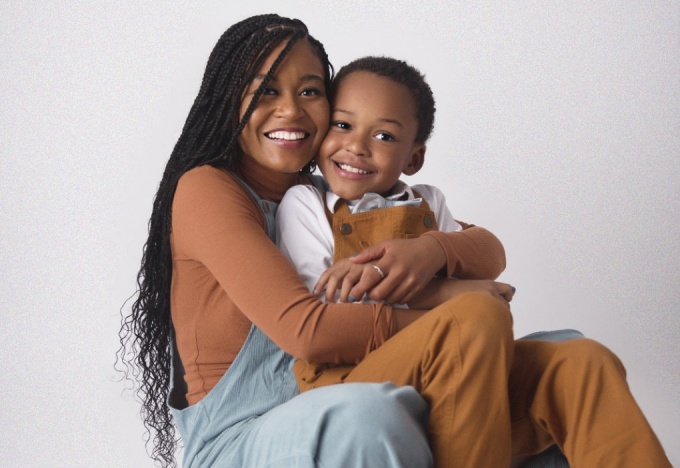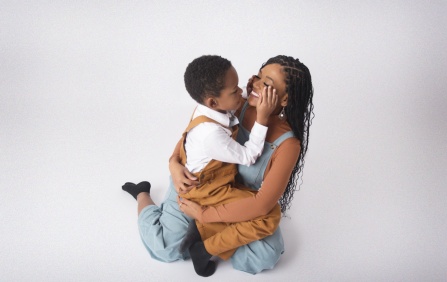Adriana Ragland, MSW ’18
Networking for neurodiversity

Adriana Ragland, MSW '18, with her son TJ. Photos: Anne Perdziak, Groovy Chic Photography.
By Devon Dams-O'Connor
As the proverb says, “It takes a village to raise a child.” But when Adriana Ragland, MSW ’18, tried to find a support network to help her son with autism, that village wasn’t there.
So, she built her own.
In 2019, Ragland founded the Neurodiversity Network of WNY, a nonprofit that advocates for the acceptance and belonging of neurodivergent individuals. The organization connects families and educators with advocacy groups and training to support neurodivergent children and adults. Through her work, Ragland is raising awareness about intellectual and developmental disabilities, promoting belonging and well-being, and challenging the status quo of local systems to prioritize equity and accessibility.
Ragland first noticed the existing gap in services when her son, TJ, was 4 years old. He attended a preschool for students with autism and joined an after-school program with typically developing kids.
“At that age, they start to put expectations on children to sit, listen and do what they’re told,” she explains. “He couldn’t. He didn’t have the skills or understanding that the other kids had, and his after-school teachers just didn’t have the training to support him.”


Ragland set out to find training opportunities for early educators of children with autism — and found none. So she pulled TJ out of the program and started the Neurodiversity Network of WNY to provide that training.
Ragland’s advocacy and drive was deeply informed by her early life, during which she developed a keen awareness of both resource gaps and of the people who worked hard to bridge those gaps. She grew up in poverty on the West Side of Buffalo. In high school, her mom enrolled her in a program at the Massachusetts Avenue Project (MAP), which offered her a job during the school year. There she learned about the food insecurity issues her family and neighbors experienced, what social justice looks like and the tremendous impact social workers can have on young people and communities.
As she neared the end of high school, MAP took her on tours to local colleges. She chose Niagara University, whose social work program focused on people in poverty. During her last year, Ragland gave birth to TJ and still graduated with her bachelor’s degree in 2015, despite struggling without emotional support and reliable transportation and daycare.
After graduation, she spent a year as an AmeriCorps VISTA member working with immigrant and refugee families at Buffalo State’s Community Academic Center and realized it would be tough to build a stable life for her son without a master’s degree in social work. A friend recommended the UB School of Social Work, which was on the bus line, and she enrolled.
Graduate school as a single mom living in poverty was challenging. She worked as a graduate assistant to help pay for school and to qualify for daycare assistance. At times, she didn’t have enough money to pay the phone bill, so she missed calls to renew her SNAP benefits. TJ was diagnosed with autism at age 3 while Ragland was still in graduate school, which sent her searching for information, resources and reassurance.
“It was a relief to know what was going on and be able to research it,” Ragland explains. “But when I started telling people, they all said what a long road of difficulty it would be. I started Googling what might be ahead, and it got scary. I realized I needed support groups with other parents who knew what was going on.”
She found a parents’ group and enrolled TJ in a preschool program at Buffalo Hearing & Speech Center, which uses the DIRFloortime® model, a trauma-informed intervention that embraces differences and prioritizes human connection. She also learned about the Neurodiversity Movement, which changed her perspective on the road ahead.
With a lot of self-advocacy and deep-seated determination, Ragland earned her master’s degree in 2018, found full-time work and founded the Neurodiversity Network a year later.
In addition to raising TJ and building her nonprofit, Ragland works full time at People Inc. as a behavior intervention specialist. There, she provides support services to people with disabilities through functional behavior assessments, clinical plans, resources and accommodations families and individuals need to thrive.
Ragland says she’s able to balance multiple caregiving roles because she prioritizes self-care — and because it’s just who she is.
“I’m resilient,” she explains. “Empathetic. Determined. Patient. I need to be all those things to work with people with disabilities all day at home and at work. My faith in God is a cornerstone of my life and adds depth and meaning to everything I do. I love to be knowledgeable and research what I don’t know. I love connecting people and building community — it’s the reason I’m here and being successful today.”